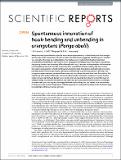Spontaneous innovation of hook-bending and unbending in orangutans (Pongo abelii)
Abstract
Betty the crow astonished the scientific world as she spontaneously crafted hook-tools from straight wire in order to lift a basket out of vertical tubes. Recently it was suggested that this species’ solution was strongly influenced by predispositions from behavioural routines from habitual hook-tool manufacture. Nevertheless, the task became a paradigm to investigate tool innovation. Considering that young humans had surprising difficulties with the task, it was yet unclear whether the innovation of a hooked tool would be feasible to primates that lacked habitual hook making. We thus tested five captive orangutans in a hook bending and unbending task. Orangutans are habitually tool-using primates that have been reported to use but not craft hooked tools for locomotion in the wild. Two orangutans spontaneously innovated hook tools and four unbent the wire from their first trial on. Pre-experience with ready-made hooks had some effect but did not lead to continuous success. Further subjects improved the hook-design feature when the task required the subjects to bent the hook at a steeper angle. Our results indicate that the ability to represent and manufacture tools according to a current need does not require stereotyped behavioural routines, but can indeed arise innovatively. Furthermore, the present study shows that the capacity for hook tool innovation is not limited to large brained birds within non-human animals.
Citation
Laumer , I B , Call , J , Bugnyar , T & Auersperg , A M I 2018 , ' Spontaneous innovation of hook-bending and unbending in orangutans ( Pongo abelii ) ' , Scientific Reports , vol. 8 , 16518 . https://doi.org/10.1038/s41598-018-34607-0
Publication
Scientific Reports
Status
Peer reviewed
ISSN
2045-2322Type
Journal article
Description
This work was supported by FWF Grants P-29084 and P-29075 to Alice Auersperg and by a uni:docs fellowship of the University of Vienna to Isabelle Laumer.Collections
Items in the St Andrews Research Repository are protected by copyright, with all rights reserved, unless otherwise indicated.

